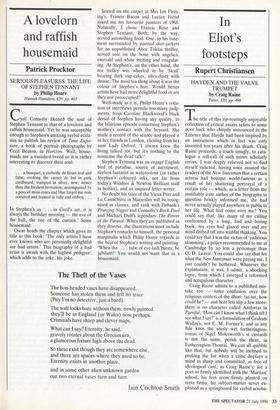A lovelorn and raffish housemaid
Patrick Procktor
SERIOUS PLEASURES: THE LIFE OF. STEPHEN TENNANT by Philip Hoare Hamish Hamilton, £20, pp. 463 Cyril Connolly likened the soul of Stephen Tennant to that of a lovelorn and raffish housemaid. Yet he was susceptible enough to Stephen's amazing verbal ecsta- sies to publish his review of Time Expo- sure, a book of portrait photographs by Cecil Beaton, in Horizon. Well, house- maids are a vanished breed so it is rather interesting to discover their soul: . . . a bouquet, a corbeille de fleurs real and false, evoking the carnet de bal in pink cardboard, stamped in silver, new; newer than the freshest invitation; accompanied by a posy of moss-roses and blue forget-me-nots corseted and framed in tulle and ribbon . . .
In Stephen's as `. . . in Cecil's art, it is always the birthday morning — the eve of the ball, the rise of the curtain.' Some housemaid.
Oscar heads the chapter which gives its title to this book: 'The only artists I have ever known who are personally delightful are bad artists.' This biography of a bad artist is awash with the highest pedigree; which adds to the joke, his joke. Seated on the carpet at Mrs Ian Flem- ing's, Francis Bacon and Lucian Freud asked me my favourite painters of 1968.
Naturally, I chose Francis Rose and Stephen Tennant. Both, by the way, served astonishing food. One, in his base- ment surrounded by painted dust-jackets for an unpublished Alice Toklas thriller, served sole on the bone with angelica, emerald and white melting and coagulat- ing. At Stephen's, on the other hand, the tea trolley was wheeled in by 'Skull' bearing dark cup-cakes, ultra-dusty with disuse. The most tea thing about it was the colour of Stephen's hair. Would better artists have had more delightful food or are they not preoccupied?
Well-made as it is, Philip Hoare's colla- tion of interviews permits too many judg- ments, from Caroline Blackwood's black denial of Stephen having any quality, to the hilarious episode concerning Stephen's mother's contact with the beyond. She made a record of the séance and played it to her friends in London, eliciting from her aunt Lady Oxford: 'I always knew the living talked rot, but it's nothing to the nonsense the dead talk.'
Stephen Tennant was an engage English bird of paradise, source of merriment, tireless fantasist in watercolour (or rather Stephen's coloured inks, not far from today's Windsor & Newton Brilliant stuff in bottles), and an inspired letter-writer.
No doubt his tales of the Vieux Port and La Cannebiere in Marseilles will be recog- nised as classics, and rank with Firbank's Prancing Nigger and Connolly's Rock Pool and Michael Duff's legendary The Power of the Parasol. When they are published as they deserve, the illustrations must include Stephen's remarks to himself, the personal marginalia which Philip Hoare regards as the best of Stephen's writing and painting: `When the . „ . tube of eye-lash bursts, be jubilant!' You would not want that in a housemaid.


















































 Previous page
Previous page